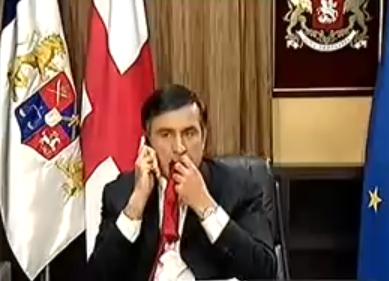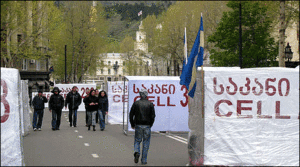
Mikhail Saakashvili is a politician known for following his gut, both figuratively and literally, as when he devoured his tie during a live BBC interview. Could this crucial organ also be his Achille’s heel?
Today, Tbilisi is a city under siege: the BBC reports that “usually the main roads in the city centre are full of fast-moving traffic. Now the cars are unable to get access because opposition supporters have closed off the roads with manned barricades”
Thus far, however, the man widely hated for provoking the Russian dismemberment of Georgia has been remarkably resistant to the near constant strikes, sit ins and even attempted government takeovers – usually by dismissing critical cabinet members and cracking down on the media, while a smitten west looks on.
But late last week, the mounting opposition fixed upon another strategy that might finally work to topple the embattled head of state: find out where he eats every night, and sabotage his dinners!
The Georgian president is renowned for his voracious love of food and fine restaurants.
As Victoria Floethe, a young Vanity Fair intern inexplicably wined and dined by him last autumn, wrote:
Pretty girls were not this potentate’s fatal flaw. Misha was much more desirous of … restaurants. He was obsessed with their meaning and importance. The more restaurants he could build, the better. He didn’t believe the Russians would attack a place that looked like Chicago.
(Possibly a strategic error on his part, as the Russian army had been training for the last 60 years precisely to attack American restaurant chains).

So how will he handle any more incidents like what happened on Thursday night?
On that occasion, hundreds of protesters surrounded him inside of the upmarket Italian restaurant where he was reportedly eating while opposition leader Georgi Khaindrava shouted into a megaphone: “Coward! You’re afraid of your own people! Get out of Georgia: the people hate you!”. Finally, an irate Saakashvili had to be whisked away in his motorcade via a back entrance mid way through his meal.
Khaindrava and his movement have vowed to follow the president everywhere he goes, in the most literal sense, and not let up until he resigns.
But who is Khaindrava and these malcontents? Contrary to accusations by Saakashvili readily echoed in western media (eg. “the Georgians quite rightly point to Moscow’s hand in Georgian unrest”), Khaindrava is anything but Moscow’s puppet.
In an interview with Café Babel, he stated: “Russia has been an imperial, aggressive land since the ninth century. It has never changed. Russia is the initiator of the barbarianism that exists in Georgia today”.
Far from siding with Russia, the opposition accuse Saakashvili of having played into Moscow’s hands and cracking down on democracy. Khaindrava:
Under Saakashvili’s regime, there is no freedom of the press anymore and we have no impartial courts either. In 2007, a peaceful demonstration was put down by army units with gas grenades. Then there were the numerous falsifications at the parliamentary and presidential elections. The independent TV station Imedi was shut down.
Because the US administration and the leaders of the European countries are turning a blind eye on the tyranny in Georgia for superior, geopolitical reasons of their own, and the completely unbalanced Saakashvili is receiving international support, despite the fact that he is practically leading a Soviet regime in Georgia –an international crisis was bound to come about.

Saakashvili might yet survive this latest challenge to his rule.
After all, notes the BBC, “in some quarters it seems that public tolerance of the opposition leaders may be starting to wear thin”.
Who will blink first: the opposition, or Saakashvili’s stomach?